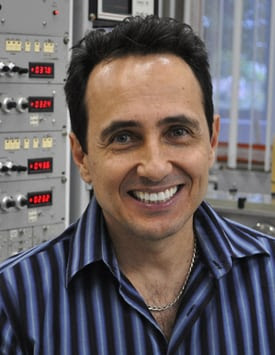- We talk to Marcos Eberlin, Thomson Mass Spectrometry Lab, Brazil:
1. Enezio tells me you are interested in the concept of design in nature. Do you relate it to your work in mass spectrometry or to other, larger issues, or both?
J. J. Thomson, the father of mass spectrometry—the man who discovered the electron and won the Nobel Prize in Physics in 1906—once said in a paper he published in Nature.
As we conquer peak after peak, we see in front of us regions full of interest and beauty, but we do not see our goal, we do not see the horizon; in the distance tower still higher peaks, which will yield to those who ascend them still wider prospects, and deepen the feeling, whose truth is emphasized by every advance in science, that “Great are the Works of the Lord.” – J.J. Thomson, Address of the President of the British Association for the Advancement of Science, Science, 30 (1909), pp. 257–279.
Mass spectrometry: In order to measure the characteristics of individual molecules, a mass spectrometer converts them to ions so that they can be moved about and manipulated by external electric and magnetic fields.
I have the same impression. Peak after peak, I see, through the eyes of MS, particularly when we are dealing with life and the Universe, that great are the works of the Lord!
2. Can a design perspective help your work? How?
Surely it can! Science is perhaps the best way available to access the Designer´s mind. And when we realize this undeniable truth, we look to science as a means toward the best solutions to our problems. We see no bad designs and no fundamental defects, but only ingenious solutions. Even though my current understanding indicates imperfections, such as junk DNA, vestigial organs, and the like, I know in advance that a great designer made everything good and then I will keep looking beyond the illusion of bad projects that are in fact a masterpiece of intelligent design.
3. Some science professionals feel threatened by a design perspective. What would you tell them as to why they should not worry?
Some colleagues feel threatened by including ID as an option because they – for instance – remember mistaken interpretations of ID such as that “figures” were drawn on the surface of the moon by its inhabitants. But we all make mistakes and similar mistakes have been made in the name of naturalism as well. When we allow fears to eliminate a priori a valid option, we can make even worse mistakes. When we eliminate a correct cause by prejudice, we will be forced to propose impossible causes.
4. What would you tell students who share your approach, to ensure that their careers continue on a productive path despite those who feel threatened?
I would tell them to be brave. To be on the side of the truth. And to avoid simply following the “flow of the waters”. To think outside the box. To be skeptical about theories that claim to be as certain as the law of gravity. Science is the culture of doubt and scientists should always doubt theories and confront the most recent data. And it is the myriad of evidence we have been collecting on life and the Universe that commands us to consider the ID hypothesis and question evolution.
5. I am told that Pos-Darwinista is a popular Portuguese-language blog. Are design issues of such interest to many Brazilians? Why might that be?
Brazilians are typically people with very open minds, always willing to consider new hypotheses. ID has therefore very much caught the attention of Brazilians. One finds, across the country, discussions about the scientific validity of evolution and the possibility that ID may replace it. Such discussions happen on blogs, Facebook pages, ebooks, whats-up groups, seminars, and other venues.
We have an ID society – TDI Brazil – with more than 700 members actively engaged in promoting ID. A Brazilian office of Discovery Institute will soon be inaugurated at Mackenzie University in Sao Paulo. The first ID conference in Brazil last year attracted close to 400 scholars and students. It seems likely – and we are working hard to make this dream come true – that Brazil will be one of the first countries in the world where ID will replace evolution as the preferred explanation for Life and the universe.
That’ll be a first. Brazil will also need to lead the world in therapy centres for recovering naturalists. Maybe the orchids with faces will help.
